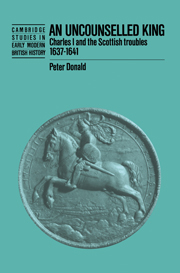Book contents
- Frontmatter
- Contents
- Preface
- List of abbreviations
- Note on the text
- 1 The king and his counsel
- 2 The king's troubles
- 3 The King's Commissioner
- 4 The king and war
- 5 A British problem
- 6 Parliaments and war
- 7 Projected settlements
- 8 An uncounselled king
- Bibliography of manuscript and printed primary sources
- Index
- Cambridge Studies in Early Modern British History
7 - Projected settlements
September 1640 – November 1641
Published online by Cambridge University Press: 20 October 2009
- Frontmatter
- Contents
- Preface
- List of abbreviations
- Note on the text
- 1 The king and his counsel
- 2 The king's troubles
- 3 The King's Commissioner
- 4 The king and war
- 5 A British problem
- 6 Parliaments and war
- 7 Projected settlements
- 8 An uncounselled king
- Bibliography of manuscript and printed primary sources
- Index
- Cambridge Studies in Early Modern British History
Summary
That Charles consented to summon a second English parliament in 1640 was the outcome of the Scottish invasion, although in intention the king was not acceding to the demands of the Covenanters, the English peers and many others of his English subjects. The summons did not necessarily signal the end of the force option as a means of defeating the Scots, but it quickly turned that way. Militarily Charles had to admit to weakness while the armies stayed on foot and money shortages became a crucial factor in the story; this as the background to a political struggle that embraced more than one kingdom pushed him to learn, albeit inadequately, the possibilities of compromise and negotiation that could get the Covenanters back to Scotland in peace. The king wished each of the kingdoms to be separately under his rule; his pragmatic concessions were not generously given. The peace for Scotland would be fragile and short-lived.
Three phases followed one another in this last period to be considered here. The forum of talks between Scots and English representatives at Ripon saw the king abandoning his immediate hopes of making progress by means of his army, forcing concentration instead on the negotiation of terms for supply of the occupying army while treaty was taken as far as possible towards conclusion. The financial burden, which fell initially on the northern counties where money was borrowed and food and necessities supplied, was referred to the king's English parliament, which sat from 3 November 1640.
- Type
- Chapter
- Information
- An Uncounselled KingCharles I and the Scottish Troubles, 1637–1641, pp. 259 - 319Publisher: Cambridge University PressPrint publication year: 1990



